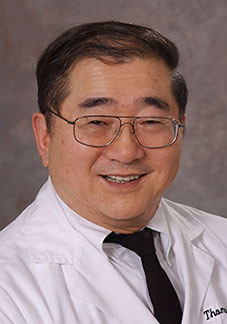Dr. Thomas Aoki’s commitment to improving the quality of life of diabetes patients with advanced complications began in the late 1970s. As the head of the Metabolism Section at the Joslin Diabetes Center in Boston and Associate Professor at Harvard Medical School, Dr. Aoki’s early research indicated that normalizing the glucose levels with subcutaneously administered insulin did not completely restore normal biochemistry. To address this problem, Dr. Aoki developed a new treatment method, based upon the key role the liver plays as chief regulator of glucose metabolism in the body.
Dr. Aoki and his team developed an outpatient procedure to treat both type 1 and type 2 diabetic patients using a combination of intravenous insulin with oral glucose during a weekly, 5 hour treatment protocol. This new treatment process stimulated and increased mitochondrial glucose oxidation in liver, muscle, peripheral and central nerve cells, and other tissues thereby insuring adequate ATP stores for normal cellular functioning. The procedure, Metabolic Activation Therapy (MAT®), is covered by 17 US and foreign patents.
In 1984, Dr. Aoki moved his research program to the University of California, Davis, where he became Chief of the Division of Endocrinology and Professor of Medicine. He also established the Aoki Diabetes Research Institute (ADRI) in 1986 to continue his research and to offer the MAT treatment process to more patients. In 1993, he published a study of 20 patients in Lancet showing that weekly MAT® treatments improved hypoglycemia awareness resulting in a 97% reduction in major hypoglycemic events in “brittle” type 1 patients, while it lowered the average HbA1c from 8.6 to 7%. This result was in striking contrast to the marked increase of hypoglycemic events seen in tight glucose control programs.
Many patients on the therapy reported improvements in their diabetic complications which were later confirmed by their ophthalmologists and nephrologists. In 2000, the results of a multi-academic center (Joslin Diabetes Center, Mayo Clinic, Scripps Institute, Temple University, University of Arizona, University of Maryland) randomized, controlled study of 49 patients over an 18 months period confirmed that the Aoki MAT® procedure slowed the progression of diabetic nephropathy in type 1 diabetic patients by a factor of 3.5.
Because of marked improvement or resolution of their complications, patients continued weekly MAT® treatment for years to prevent recurrence. Unpublished data on a large group of long term patients (type 1 and type 2) treated in Sacramento, CA and Fukui, Japan includes patients suffering from progressive diabetic nephropathy. In all cases, the rate of decline of renal function slowed or stabilized as result of the MAT® treatment and over the long term appears to have resulted in delay of end stage renal disease. Included in the group of long term patients are type 2 diabetic patients who have been treated an average of 12 years. This treatment has an excellent safety record. Hypoglycemia, the only side effect, occurred at a very low rate and resolved promptly.
Dr. Aoki retired from his position at the University of California Davis January 31, 2011 to devote full time to further development of the MAT® treatment regimen at ADRI and to encourage wider use of the therapy.
